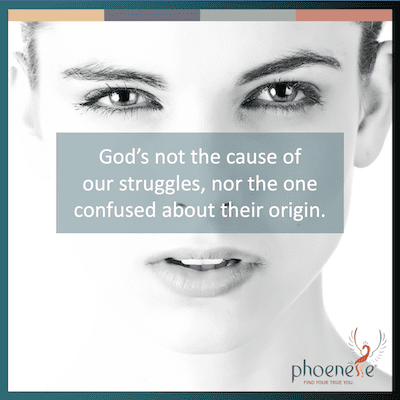
God’s not the cause of our struggles, nor the one confused about their origin.
Free will
The concept of free will leads us to understand that we humans are—in some way, shape or form—responsible for everything that happens to us, including our suffering. So then the question comes up: If God is all-loving and all-knowing, then God knows the future. Which means when God gave us free will, he must have known this would happen, i.e. we would become destructive and petty and hell-bent on getting a leg up on everyone else. In other words, that we would struggle mightily just to get along. Why didn’t God act to prevent this?
Embedded in this question is one of humanity’s oldest conundrums. On the one hand, we believe—stemming from religious teachings—that God is an all-seeing Father who acts at will. He will reward us if we obey his laws, and he will manage all the difficulties of our lives—without us having to lift a finger—as long as we humbly ask for help.
On the other hand, people are free to do whatever the heck they please; we mold our own fate and we are responsible for our lives. Religion gives lip service to this idea, while at the same time crippling us by forcing us to follow certain rules. If we want, you know, to get the goodies.
It’s no wonder we get confused. And this perplexing question about God and free will is an example of this.
Out of our minds
Yet the notion of an omnipotent God and humanity’s self-responsibility only seem to be mutually exclusive when viewed from the mind of humans, where time is a thing. For we can only conceive of a God who acts the way we do, operating according to a linear timeline and over-thinking how to manipulate what will happen in the future, to avoid any unpleasantness.
God is not in the business of taking things away from us, or adding on.
The future, however, is a product of time. And time is a product of the mind. So in reality, the future does not exist, just as the past does not exist. Mind blowing, I know. No really, this is pretty much impossible for the human brain to wrap itself around.
Beyond the mind, there is simply being. That is, there is no past and there is no future. There is just right now. Perhaps we can get a vague sense of this, but to do so we’ll have to feel into it rather than think our way through it. For indeed, our minds cannot understand what is beyond the mind. And yes, there is something more.
The trouble is, we have this concept of a God who does things. But creation, in the biggest sense of the word, is not a time-bound action. When God created spiritual beings, it was out of time, out of mind, and in the state of being.
God, then, is not in the business of taking things away from us, or adding on. And why would he, since he/she doesn’t need to? God made us with free will so we all have the ability to learn to make the best choices—like right now, today—and take good care of ourselves. After all, we are all beings who are God-like and capable of creating our own lives.
The key to reducing our suffering
Now here’s something else to consider. It’s a complete illusion that pain and suffering are the worst things in the world. They’re just terrible, we all think. And so we have this excessive fear of suffering that is frankly not very realistic. This is a product of our busy little minds, and it’s in error.
Why do we fear pain and suffering so much? Because we wrongly believe it has nothing whatsoever to do with us. We think it can come to us without our being in any way responsible for it. In other words, it’s all a random, chaotic coincidence when unhappy things befall us.
Once we discover, however, that every painful experience we’ve ever encountered has been caused by our own resistance and our evasions of truth, well, that changes everything. Once we get this, not as some new-agey “we create our own reality” BS, but when we actually connect the inner links, we will no longer fear life and it’s less-than-pleasant experiences.
Why do we fear pain and suffering so much? Because we wrongly believe it has nothing whatsoever to do with us.
Long before we can begin to use this new key, we will realize that we do, in fact, hold the key in our own pocket. Then we will stop bracing ourselves against the supposed arbitrary nature of life against which we feel so darned helpless. Then, and only then, will our suffering take on new meaning and become, of all things, highly productive.
Once we reach this turn of events, suffering won’t seem nearly so bad. More to the point, it’s not half as frightening as our fear of it would have us believe. For isn’t it the case that when we fear something before it happens, our fear is way worse than the experience turns out to be, once we go through it?
Here’s something else we’ve also probably experienced: our pains take on a whole new face once we get a good look at them and see how we created them. If we can observe all this, without getting hung up in our demands for perfection, or in moralizing and justifying our misguided behavior, the pain will magically diminish. Poof, just like that, it backs off, even though the outer situation hasn’t yet budged.
Our beautiful problems
When we come to terms with our current reality—the life we have so far created—we can then also accept that, yep, things are not perfect. And if we don’t now flip out and rebel against imperfection, many of our painful patterns will start to transform and—voilà!—we will begin to cause ourselves less suffering.
What triggers us to rebel against any of this happening is our expectation—perhaps conscious, but just as likely unconscious—that life should be perfect. Ergo, we resist and we put up barriers, which of course does nothing more than cause more imperfection and suffering than life would otherwise offer up.
Our problems are, in truth, the most beautiful things that life on Earth has to offer.
In the end then, it’s our attitude toward suffering—or toward life and our present place in it—as well as toward ourselves, that determines whether or not we suffer. If we didn’t have such a distorted view about suffering, we would find that the problems we need to face and resolve are really quite…beautiful. They are, in truth, the most beautiful things that life on Earth has to offer.
How so? Because only when we conquer our blindness and resistance—when we tackle our lack of awareness—can we experience the beauty of life. It doesn’t matter that at one time or another we will need to go through difficult periods while at other times we will experience joy and fulfillment. What matters is that we get there, to where we understand our inner landscape and see how our own rocky road has contributed to our stumbling.
When that happens, questions about why God hasn’t stepped in and taken away all our difficulties won’t come up. For God is neither the cause of our struggles nor the one who has been so confused about the origin of them.
Self-responsibility: The path to awareness
Having self-responsibility then does not contradict the reality of an omnipotent creator. For were we to have full awareness of our wrong attitudes, behaviors and conclusions, we would get it. All we have to do is face ourselves. With no more resistance, no more pretending we are better than we are, and no more striving to be perfect. We only need to see ourselves as we truly are, in this moment. The way God sees us.
When we can view every little aspect of ourselves with such freedom, we will be, in that moment, in a state of being. And then inside ourselves we will perceive the truth of God. In that instant, we will have the profound realization that total self-responsibility does not exclude there being a supreme being. Actually, it’s evidence of how such a thing could be possible.
—The Guide’s wisdom in Jill Loree’s words

Next Chapter • Return to Contents
Adapted from Pathwork Q&A at the end of lecture #105: Humanity’s Relationship to God in Various Stages of Development
Read also Why Did God Make War?
We Can Heal | After the Ego • Blinded by Fear
Real. Clear. series | Holy Moly • Finding Gold • Bible Me This • The Pull • Pearls • Gems • Bones • Nutshells
All essays | Get a Better Boat • Living Light • Latest essays
Self. Care. series | Spilling the Script • Healing the Hurt • Doing the Work
More books | Walker • Word for Word • Spiritual Laws • Keywords



